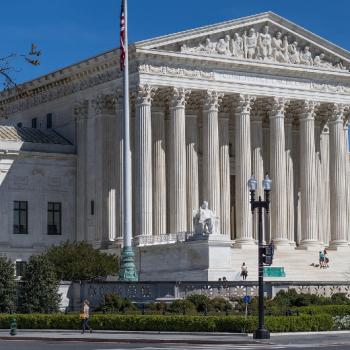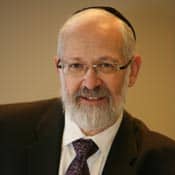Staring into the face of evil without flinching has been one of the toughest challenges to believers. Paradoxically, unpopular views about G-d's responsibility for evil can lead to the most optimistic visions for the future.
Believers in a good and all-powerful G-d have struggled with the existence of evil since ancient times. The Book of Job tackles the problem, but most readers find more unanswered questions in it than solutions. (That may be the point of the book.) Some ancient faiths solved the problem by positing two gods, a good god and a bad god. The good god never dirtied his hands with all the messy stuff. End of problem.
Western monotheists are committed to a single G-d. Therefore, they don't have a convenient round file in which to toss evil where it won't raise disturbing questions. Some circles only speak of G-d in regard to pleasant phenomena, which are then gratefully attributed to Him. Unlikeable phenomena just "happen," or are attributed to "nature" or randomness. This leaves G-d with a cleaner CV but uncomfortably leaves Him master of only the part of the universe that is good. He apparently stays out of certain "no-go" zones.
Traditional Jews refuse to go that route. They recall Isaiah's description of G-d: "Who forms light and creates darkness, Who makes peace and creates evil" (Is. 45:7). Jews therefore have a tougher time dealing with evil, because they cannot dismiss it from G-d's responsibility. They would rather admit to failure in understanding how a G-d who is entirely good can permit evil to exist—effectively empowering it—than to limit or enfeeble Him.
They therefore have to include evil in systematic approaches to the way G-d interacts with our world. The Jewish mystical tradition provides one of the most intriguing ways to leave conceptual room for evil. It groups the different observed "characteristics" of G-d around two poles: benevolence and justice. The former reaches out with unstinting kindness; the latter is restrictive. Evil arises as a consequence of the justice attribute limiting how G-d manifests Himself. That same limitation gives man freedom of will and hence allows man to deny Him and do evil. More simply put, good is primary; evil's lease on life is collateral damage caused by the Divine gift of moral freedom.
How that translates into simple terms can be breathtaking.
Growing up in the Democratic Republic of the Congo, Ely Shabani Katembo saw savagery that would suck the life force out of others. His country is the single richest on earth when measured by its mineral wealth—but that has been its greatest curse. To date 5.4 million people have perished in the ongoing wars for control of the riches. It is the rape capital of the world, with 200,000 victims.
Like victims of the Holocaust, Ely saw things that no human being ought to have seen. He determined to move himself as far from the conflict as he could, and set out, on foot, on a 3,000-kilometer walk. He narrowly escaped death a number of times. He was fortunate to be able both to enter the U.S. and receive a Western education. Today, he works in D.C. as an international development consultant.
Safely ensconced on the Beltway, his psyche should have shut down the old memories, allowing him to fully utilize his opportunity to begin a new life. In fact, Ely cannot do that. Without a trace of anger or bitterness, he nonetheless says with passion that he cannot forget his country and the suffering he knows takes place and will continue to take place unless something breaks the cycle of violence.
Jews had helped him along the way, and he and his friends feel close to Israel. After meeting my colleague Rabbi Abraham Cooper at a conference on anti-Semitism in Canada, he sought his help for his campaign, thinking that Jews surely would be the ones to offer assistance and insight. This brought him to the headquarters of the Simon Wiesenthal Center last week, where we both spent some time with him, pointing out the people on the Hill who would be interested in his insights about the Congo in general and the upcoming November election there in particular.
I wanted to hear more of his story, and he was more than willing to comply. Every time he speaks of the gargantuan task ahead, he must feel overwhelmed. A bit of that feeling intruded in the conversation, and I knew that I should offer some reassurance.
Enter Osama bin Laden. More accurately, exit bin Laden. I shared with Ely a thought that a prominent New York educator had shared with his students: "Think of who bin Laden was. The 17th child out of 54, he could have lived in rich mediocrity and obscurity. Instead, he shook the world, and changed not only the course of history, but the way hundreds of millions of people would live their daily lives. For a decade, he escaped a manhunt organized by the most capable governments on the planet. One man accomplished so much in the service of evil! As believers in the G-d of the Bible, we believe that the power of good is so much greater than the power of evil. Think of how much good one person can do!"
Non-believers come in all varieties. They can choose to look at the world with rose-colored glasses, and exude optimism. Or, if they want, they can pessimistically forecast doom and destruction. For them, bin Laden's example doesn't prove anything at all, because good and evil are not organically related. They just happen.
People who subscribe to the Judeo-Christian understanding of G-d, however have to be optimists, because they are committed to see evil as subordinate to good, and therefore far less powerful. In the continuing debate about what bin Laden's demise means to us, we should not lose sight of what his career in evil should be telling us about our capacity for good.
5/16/2011 4:00:00 AM





